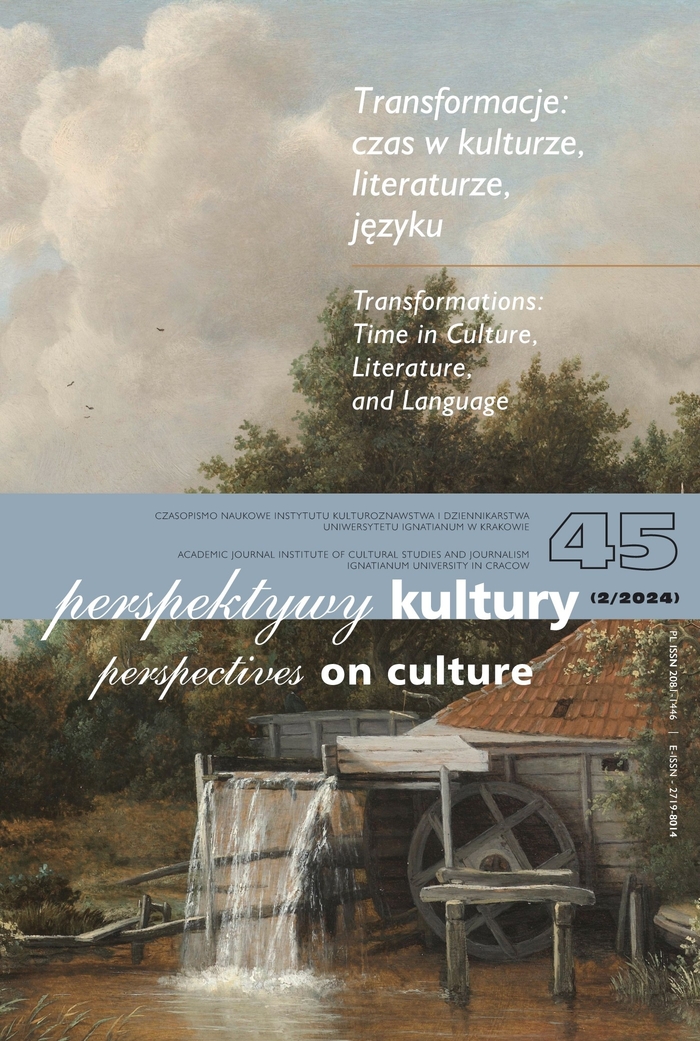“We order our lives with barely held stories”
Limitations of Self-Narrative in Michael Ondaaje’s Warlight
Abstract
In his latest novel, Warlight (2018), Michael Ondaatje returns to the theme of identity and explores the role of familial past and history which intersect in the life of his protagonist. In the article I argue that the novel highlights the limitations of the self-narrative it contains and problematizes the idea of a simple recreation of life as a source of identity and self-understanding, a belief which informs Paul Ricoeur’s conception of narrative identity. I show that the narrator’s recreations of his and his mother’s life stories display problems associated with self-narratives, frequently invoked by critics of Ricoeur’s conception, such as the narrator’s unconscious and defensive motives, which undermine both his story and the subjectivity it constructs. Additionally, the fact that the narrator’s biography is situated in the context of intergenerational legacies, long temporal scales, and the non-human environment allows us to view his life, his traits and qualities from those wider perspectives as shaped by both human and non-human factors. This insight further challenges the narrator’s mastery and the story’s causal structure. The article employs contemporary discourses which foreground the impact of deep time and of the nonhuman context on narrative and subjectivity to illuminate the significance of those extended perspectives in the novel. In its questioning of self-narrative as a source of self-understanding and identity, the novel shifts away from the anthropocentric focus on biographical time and human perspective to the recognition of our embeddedness in deep time and the non-human environment.
References
Caracciolo, M. (2021). Emplotment beyond the human scale: On deep time and narrative nonlinearity.” Poetics Today, 42 (3), 341–359. DOI: 10.1215/03335372-9026131.
Crone, K. (2020). The self-understanding of persons beyond narrativity. Philosophical Explorations, 23 (1), 65-77. DOI: 10.1080/13869795.2020.1711961.
Crowley, P. (2003). Paul Ricoeur: the concept of narrative identity, the trace of autobiography. Paragraph, 26 (3), 1-12. DOI: 10.3366/para.2003.26.3.1.
Guldi, J. and D. Armitage. (2014). The history manifesto. Cambridge University Press.
Hansen, J. (2016). Theories of memory and the imaginative force of fiction. in S. Kattago (Ed.), The Ashgate Research Companion to Memory Studies. Oxon: Routledge, 197-208.
Lawtoo, N. (2022). Homo Mimeticus. A new theory of imitation. Leuven: Leuven University Press.
Ondaatje, M. (2019). Warlight. New York: Vintage Books.
Ricoeur, P. (1991). From text to action. Trans. K. Blamey and J.B. Thompson. Evanston, IL: Northwestern University Press.
Sawyer, S. W. (2015). Time after time: narratives of the longue durée in the Anthropocene. Transatlantica. American Studies Journal, 1, 1-17. DOI: 10.4000/transatlantica.7344.
Strawson, G. (2004a). A fallacy of our age. Times Literary Supplement, 13-15.
----. (2004b). Against narrativity. Ratio XVII, 428-452.
Vice, S. (2003). Literature and the narrative self.” Philosophy 78, 93-108.
Whitehead, A. (2009). Memory. Oxon: Routledge.
Copyright (c) 2024 Perspectives on Culture

This work is licensed under a Creative Commons Attribution-NoDerivatives 4.0 International License.
Autor, zgłaszając swój artykuł, wyraża zgodę na korzystanie przez Wydawnictwo Uniwersystet Ignatianum z utworu na następujących polach eksploatacji:
- utrwalania utworu w formie papierowej, a także na nośniku cyfrowym lub magnetycznym;
- zwielokrotnienia utworu dowolną techniką, bez ograniczenia ilości wydań i liczby egzemplarzy;
- rozpowszechniania utworu i jego zwielokrotnionych egzemplarzy na jakimkolwiek nośniku, w tym wprowadzenia do obrotu, sprzedaży, użyczenia, najmu;
- wprowadzenia utworu do pamięci komputera;
- rozpowszechniania utworu w sieciach informatycznych, w tym w sieci Internet;
- publicznego wykonania, wystawienia, wyświetlenia, odtworzenia oraz nadawania i reemitowania, a także publicznego udostępniania utworu w taki sposób, aby każdy mógł mieć do niego dostęp w miejscu i czasie przez siebie wybranym.
Wydawca zobowiązuje się szanować osobiste prawa autorskie do utworu.





